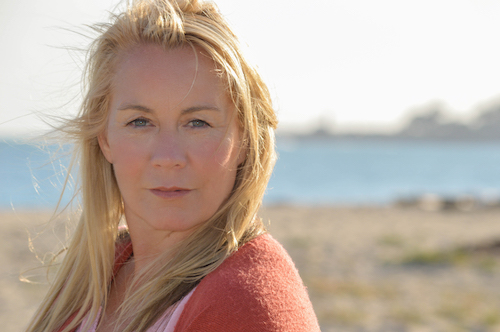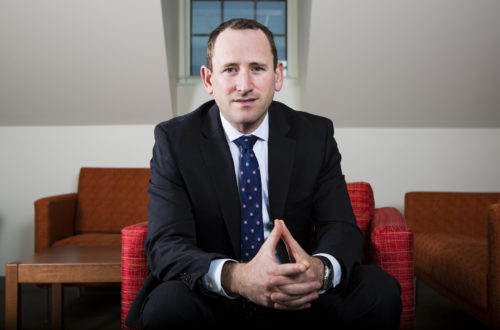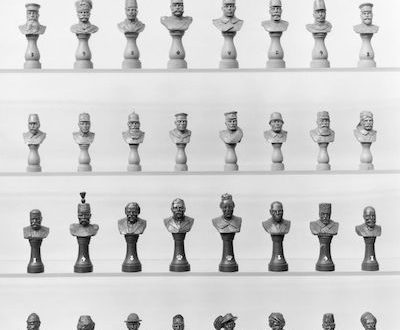
Address to The New School Graduating 2020 Class from Lara Love Hardin
Lara Love Hardin will be giving this speech on LIVE with LIT as a part of LIT’s Commencement 2020 this Tuesday, May 19th at 7pm. Join here.
*
I have trouble walking through doorways. I never get it right, I’m close, but always seem to catch a shoulder, a forearm, a hip on the frame. I forget that I am someone who never quite gets it right, until I find the mysterious bruises on my body and remember. As a child I used to walk down a city block and then abruptly make a right turn and walk into the wall of a building. My entire adolescence was spent with a giant egg in the middle of my forehead. Even on my Big Wheel as a toddler, I would often find myself going full speed into the curb, awareness only happening when I was laid out flat on the asphalt.
The point is this: Every writer I know is just a little bit off.
And even with the pain and the bruising and the blood, it is a thing to be celebrated.
Growing up, I wanted to be a writer simply because it was something I was good at. I was praised for my writing. I won awards in high school. I liked the praise. I liked the awards. In college it seemed logical to major in what I was good at, and getting an MFA also seemed like the appropriate thing to do. In 1989 when I graduated college, UC Irvine only allowed six students into its MFA program in fiction. At first they didn’t want me because I was coming straight out of college. All the other students (12 of us total) were at least a decade older than me. UCI’s theory was that older students would have more to write about. But it was the late ’80’s and Brett Easton Ellis had just become rich and famous at 21 for his novel, Less Than Zero. At UC Irvine, Michael Chabon had just gotten a six -figure advance for his Master’s thesis, one that the head of the program, Don Heiney had secretly sent to a literary agent. I was admitted into the program after I wrote an impassioned letter to convince the faculty that I was much older and wiser than my 22-years might suggest.
I wasn’t.
The truth is, I just didn’t know what else to do with my life.
I only wanted the fame and fortune that I was sure was just around the corner.
I never once stopped and thought about who I was and why I wrote.
When I graduated, I didn’t write for the next 20 years.
But I never stopped crashing into things.
And at the age of 42 I found myself once again laid out flat on the asphalt, staring up at the sky wondering what had happened. Only this time, broken and bruised and bloody with nothing left to lose, I was brave enough to figure it out.
***
Today, 11 years later, I have written 12 books, 4 New York Times bestsellers.
I am a successful literary agent.
I have helped build one of the most prestigious non-fiction literary agencies in the world.
I have had a hand in creating 13 New York Times bestsellers. I’ve meditated with the Dalai Lama while working on The Book of Joy with him and Archbishop Desmond Tutu. I’ve worked with Stanford professors, Nobel Prize winners, the world’s leading experts in psychology and the social sciences, and I have worked with Bryan Stevenson and others on the frontlines of social justice reform.
The Sun Does Shine, a book I co-authored with Anthony Ray Hinton about his 30 years on death row for a crime he didn’t commit, was picked by Oprah for her book club. In 2019 the book was shortlisted for the Dayton Literary Peace Prize, nominated for an NAACP aware, won the Moore Prize in the UK, and my co-author and I were awarded the Christopher Award given to those who affirm the highest values of the human spirit.
And through all of that I’ve had a secret. One I worried my author clients would find out about. I lived in absolute fear at the idea someone might Google me. I hid in the shadows, in the acknowledgment sections of the books I wrote for other people. I told myself I was in service to the work, to the authors I wrote for, and to the world. All of that was and is true.
But what is even truer is that I felt safer hiding behind other people’s names on books.
I knew how to be anybody on the page.
Anybody that is, except myself.
****
The life I hadn’t lived before I entered my MFA program, I lived in full after. My first son was born two weeks before my MFA thesis was due. I got married while pregnant with son number two, only because I was too afraid to say no when he asked. I knew we weren’t compatible long term, but I wanted to create the family I never had, so I said yes. That’s the first time I remember being truly too afraid to speak my truth. The marriage was over by the time my third son was born, and I grieved the imaginary perfect family I wouldn’t have. I was a single mom with three boys all under the age of 5. Writing wasn’t practical, so I learned bookkeeping and then got my real estate license. I did whatever job I could to pay the bills and still be home with my boys. I was grieving the loss of my happily ever after story, I was depressed, and in my grief and depression, I began taking pain pills. The pills made me braver, better, stronger. I would spend 20 years in and out of that addiction.
What I didn’t realize was that writing was how I made sense of the world, how I processed pain, and made meaning out of my own suffering and other suffering. Without writing, I needed the pills to both feel and not feel.
This kind of story never ends well.
In 2004 I remarried and had another son.
Addiction didn’t care how hard I pretended to be okay or how I looked on the outside.
On Election Day 2008, I was arrested in my home. My youngest son was the only child home with me when the sheriff’s department came through the door. He was three years old. He was terrified and crying and I couldn’t comfort him because my hands were handcuffed behind my back.
It was the stuff of nightmares.
Strangers took him out of the house.
He had never spent a night away from me.
In jail two nights later, not knowing where my son was and imagining the worst (my other three boys were with my ex-husband), I tied a sheet around my neck. I believed that I had failed at this life so thoroughly and so completely that the only option was to end my life.
Everything I loved was gone. My freedom was gone. I had no inner strength to get through what was in front of me, and truly believed that redemption was reserved for the good and the worthy. I had brought this on myself.
I believed I would never see my children again.
I believed I was completely alone.
I believed I was bad.
And so I hung my head in shame and then I tried to hang myself.
I failed at that too.
In the end I was convicted of 32 felonies—just to put this in perspective, Charles Manson was convicted of seven.
The newspaper ran a front-page picture of my face with a headline calling me “The Neighbor From Hell.” I had hurt everyone I loved and imploded all of our lives.
I spent a year in jail.
I learned to meditate.
And I began to write again.
When I got out of jail I was jobless, homeless, carless, friendless, and without my children. The only thing I had an abundance of was shame.
And shame is insidious. It seeps into your bones, curls around every tendon that holds you together, and coats each cell like sticky tar. It weighs you down and makes each step you take a million times harder.
I made shame my best friend and I took that bitch everywhere.
So yes, I was once the neighbor from hell and convicted of 32 felonies for identity theft.
I now get paid lots of money to assume people’s identities on the page.
The universe loves irony.
*****
Writing is not an easy life, but then again, I don’t really know any life that’s easy. Life is just hard, but that’s why the world needs writers.
It’s not easy to write and share what you have written—whether it’s fiction, essays, humor, poetry, non-fiction. It’s vulnerable, it’s scary, and it always feels like one of those dreams where you are standing up in front of your class to give a school report only to find out you’re naked.
Super naked.
And you are.
But your naked self is beautiful. When you are naked you can’t hide, you can’t distract, you can’t hustle reality into something different. Naked is true.
As writers I challenge you to stay naked.
I started my writing career in a graduate MFA program with no idea about what writing meant to me or what it took to be a writer. And it’s weird to be a cautionary tale and an inspiration at the same time. If I could go back in time and talk to the me who was just entering an MFA writing program or the me who was just graduating an MFA writing program, this is what I would tell her.
Writing is not a luxury—it is a necessity.
The world needs writers because writers hold up a mirror to suffering, to joy, to the mundane and the fantastical, to inexplicable coincidences and irrational horrors, to injustice, to pain, to trauma, to prejudice, to hilarity, to everything horrible and wonderful in the experience of being human. Writing is noble and necessary.
Writers write. Yes, writers think and talk and theorize and analyze writing, but that should be at most 5% of how writers spend their writing life. Five percent should be spent on reading. 90% should be spent on writing. You are a writer if you spend your time writing. Full stop.
Writers don’t have back up plans. Do not have a fall back career. This is a trap and you will find yourself 25 years down the road regretting the years you didn’t write.
I promise you that you won’t starve. Your car may be shit, but that’s an okay trade-off for a writing life.
Writing is not done is isolation.
Do not hide in a cabin Unabomber style and think you will create a masterpiece. Genius is always a collaborative effort. Support other writers, learn from other writers, share with other writers, and ask for help. I have read a million lines in books that I have jealously wished I had written myself. Do not be jealous of other writers because you are all on the same team. Do not compare yourself to other writers—for better or for worse. Jealousy is not a good look on anyone.
There is no such thing as writer’s block.
Seriously. It’s not a thing. If you have writer’s block that just means you don’t have enough information. For fiction it means you don’t know your characters and their motivations, or you don’t know your premise or your story arc or the reasons why this particular story matters. For non-fiction it may mean you don’t have enough research or a clear evolution of ideas. For memoir writers it just means that the mirror that all writers hold up to the world hasn’t been turned around.
Be honest.
The best writers are ultimately the most honest writers. They write what’s true for them because they believe it’s true for others. I don’t believe in the advice to write what you know. Just write what’s true.
Be vulnerable.
This doesn’t mean be overwrought or share transcripts of your therapy sessions. It means silence the voices of other people—their judgments, their gossip, their criticisms—and share what you want to share with the world. Share your mind and your heart and your experiences generously.
Let go of timelines.
It took me 25 years to get my dream job as a writer. It also took me two months to write a New York Times bestseller. Writing a book doesn’t have to take years. It will always take as much time as you think it takes. Done is sometimes better than perfect. So let go of all those preconceived ideas about what it will take to finish a book, but also give yourself deadlines. When I have something to write I will give myself a mini deadline of 3 pages in an hour. Or a full chapter by noon (I like to write starting at 4am). If you have enough information and you believe it’s possible, you can easily write a chapter a day.
Don’t be a writing snob.
Literary fiction is not better than genre fiction. Non-fiction is not better than satire. Writing a book is not better than a blog. Remember, writer’s write, and good writers can write anything. Another reason not to have a back up career. I once wrote SEO keyword blogs about savings accounts, and I treated each one like a literary masterpiece of a short story. It’s all training and it all helps pay the bills.
Don’t take yourself too seriously.
In the end writers are just people who rearrange 26 letters over and over again. It’s not rocket science. Or brain surgery. It’s not life and death and nobody likes a pretentious writer.
Act extroverted, even if you are an introvert by nature.
I’ve trained over a dozen MFA fiction graduates to be collaborative writers for non-fiction books, and the one thing I can’t teach them is voice. Whether it’s for fictional characters or real people, capturing authentic voices on the page is something you have or you don’t. The people who have it have learned to get out of their own heads and beyond their own circle of friends. Listen to people. Listen to people who are different from you. Engage with the world even if your comfort zone doesn’t extend beyond your couch. Actively try to understand how other people make sense of their own lives. Do things and have conversations that scare you.
Cultivate empathy.
The best writers have the ability to place themselves inside the skin of another person and view the world through their eyes and their consciousness. Empathy is the writer’s superpower and a weapon. Wield it responsibly.
Embrace your weirdness. Be uniquely you.
You will implode your life.
You will be forgiven and you will learn to forgive.
You can mine your trauma like it’s gold.
Your trauma is gold.
You will succeed and you will fail and you will succeed again.
You will crash into walls.
You will cry and bleed and want to give up.
You won’t.
And in that eternal moment, between wanting to give up and not giving up, you will find vast worlds, universes even, where billions of stories and ideas are just waiting for you, and only you, to give them a voice.
Writing is an act of courage.
Pick a story to tell.
Be brave.
*
Lara Love Hardin is the COO and Editorial Director of Idea Architects, a literary agency and media company based in Santa Cruz, California that represents and works with luminaries such as Archbishop Desmond Tutu, Bryan Stevenson, His Holiness the Dalai Lama, Steven Hawking, Jane Goodall, John Gottman, and many other academics and thought leaders. She has an MFA in creative writing and is a 4-time New York Times bestselling collaborative writer, including the #1 New York Times bestseller Designing Your Life by Dave Evans and Bill Burnett, and recent Oprah Book Club pick, The Sun Does Shine, which she co-authored with Anthony Ray Hinton. In 2019 she won a Christopher Award for her work “affirming the highest values of the human spirit.” In 2019 she was also nominated for an NAACP Image Award and short-listed for the Dayton Literary Peace Prize.



